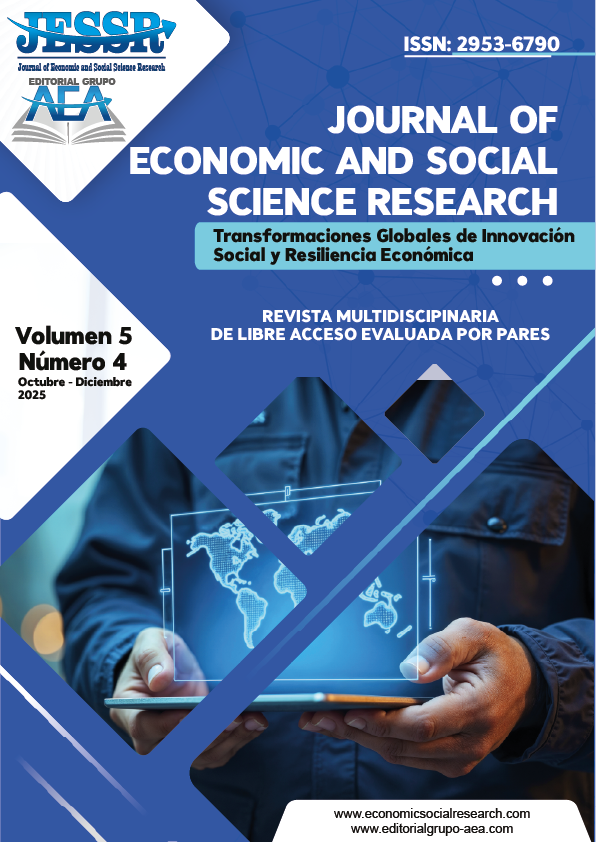Modelos predictivos para medir la eficiencia del juego matemático inclusivo en estudiantes de la unidad educativa “Manuela Cañizares”, Orellana
Contenido principal del artículo
Resumen
La educación inclusiva es clave para garantizar que todos tengan la oportunidad de aprender de manera justa, pero los estudiantes con necesidades especiales a menudo enfrentan desafíos significativos, especialmente en matemáticas. Esta investigación se enfoca en evaluar la efectividad de un juego matemático inclusivo en la Unidad Educativa "Manuela Cañizares" de Orellana, creado específicamente para estudiantes con necesidades especiales. Se utilizó un enfoque cuantitativo y un diseño cuasi-experimental de tipo pretest–postest, aplicando la metodología CRISP-DM para gestionar los datos. La muestra incluyó a 124 estudiantes con necesidades especiales, y se analizaron en profundidad variables como la edad, el tipo de necesidad especial, el nivel educativo, la asistencia, los intentos en el juego y la motivación. Se emplearon modelos de regresión logística y análisis de series temporales para evaluar el impacto del juego en el rendimiento académico. Los resultados mostraron una mejora del 25% en las habilidades matemáticas y una correlación positiva significativa entre la motivación y el desempeño de los estudiantes. Además, el modelo predictivo alcanzó un 96% de precisión, lo que respalda su efectividad para anticipar el progreso académico. En conclusión, la combinación de gamificación y modelos predictivos en la educación inclusiva representa una estrategia innovadora y efectiva, y se recomienda su implementación en diversos contextos, así como la capacitación de los docentes en metodologías pedagógicas adaptativas.
##plugins.themes.bootstrap3.displayStats.downloads##
Detalles del artículo
Sección

Esta obra está bajo una licencia internacional Creative Commons Atribución-NoComercial 4.0.
Cómo citar
Referencias
Arcila Calderón, C., Ortega Mohedano, F., Álvarez, M., & Vicente Mariño, M. (2019). Análisis distribuido y supervisado de sentimientos en Twitter: Integrando aprendizaje automático y analítica en tiempo real para retos de dimensión big data en investigación de comunicación y audiencias. Empiria. Revista de metodología de ciencias sociales, (42), 113–136. https://doi.org/10.5944/empiria.42.2019.23254 DOI: https://doi.org/10.5944/empiria.42.2019.23254
Baker, R. S., & Yacef, K. (2009). The state of educational data mining in 2009: A review and future visions. Journal of Educational Data Mining, 1(1), 3-17. https://jedm.educationaldatamining.org
Bang, M., Vongkulluksn, V. W., Xie, K., & Hu, X. (2022). Gamification and mathematics learning: A meta-analysis on the impact of digital games in K-12 education. Educational Technology Research and Development, 70(3), 837-861. https://doi.org/10.1007/s11423-021-10017-4 DOI: https://doi.org/10.1007/s11423-021-10017-4
Cajamarca-Correa, M. A., Cangas-Cadena, A. L., Sánchez-Simbaña, S. E., & Pérez-Guillermo, A. G. (2024). Nuevas tendencias en el uso de recursos y herramientas de la Tecnología Educativa para la Educación Universitaria . Journal of Economic and Social Science Research, 4(3), 127–150. https://doi.org/10.55813/gaea/jessr/v4/n3/124 DOI: https://doi.org/10.55813/gaea/jessr/v4/n3/124
Chapman, P., Clinton, J., Kerber, R., Khabaza, T., Reinartz, T., Shearer, C., & Wirth, R. (2000). CRISP-DM 1.0: Step-by-step data mining guide. SPSS Inc. https://www.kde.cs.uni-kassel.de/lehre/ws2012-13/kdd/files/CRISPWP-0800.pdf
Concha-Ramirez, J. A., Saavedra-Calberto, I. M., Ordoñez-Loor, I. I., & Alcivar-Córdova, D. M. (2023). Impacto de la gamificación en la motivación y el compromiso estudiantil en educación primaria. Revista Científica Ciencia Y Método, 1(4), 44-55. https://doi.org/10.55813/gaea/rcym/v1/n4/22 DOI: https://doi.org/10.55813/gaea/rcym/v1/n4/22
Del Campo, M., López, M., & Sanabria, A. (2017). Estrategias para la enseñanza inclusiva de las matemáticas: Un enfoque constructivista. Revista de Educación Inclusiva, 10(2), 45-63. https://revistaeducacioninclusiva.com
Durairaj, M., & Vijitha, S. (2014). Educational Data Mining for Prediction of Student Performance Using Clustering Algorithms. International Journal of Computer Applications, 99(3), 1-7. https://doi.org/10.5120/17418-7823
García, E., Sánchez, J., & Ríos, F. (2021). Análisis de series temporales en la educación: Evaluación del aprendizaje basado en juegos. Revista Internacional de Tecnología Educativa, 13(1), 112-130. https://doi.org/10.1016/j.rtedu.2021.05.009
Michuy-Guingla, T. E., Fajardo-Andrade, C. A., Fajardo-Andrade, M. F., Limongi-Basantes, D. S., & Quiroz-Parraga, F. A. (2025). La tecnología educativa en el proceso de aprendizaje de estudiantes con necesidades educativas especificas. Revista Científica Ciencia Y Método, 3(3), 42-58. https://doi.org/10.55813/gaea/rcym/v3/n3/59 DOI: https://doi.org/10.55813/gaea/rcym/v3/n3/59
Moreno, R., Torres, J., & Pérez, M. (2020). La relación entre motivación y aprendizaje en estudiantes con necesidades educativas especiales. Revista Latinoamericana de Psicología Educativa, 9(2), 67-89. https://doi.org/10.1016/j.psicoedu.2020.07.005
Piaget, J. (2013). Play, dreams and imitation in childhood. Norton. https://doi.org/10.4324/9781315009698 DOI: https://doi.org/10.4324/9781315009698
Ramani, G. B., Purpura, D. J., & Cirino, P. T. (2020). The Role of Play in Mathematics Learning for Young Children. Journal of Numerical Cognition, 6(2), 123-140. https://doi.org/10.5964/jnc.v6i2.437
Rodríguez-García, A., & Arias-Gago, A. R. (2022). Modelos didácticos en matemáticas y su relación con el aprendizaje significativo. Profesorado. Revista de Currículum y Formación del Profesorado. https://revistaseug.ugr.es/index.php/profesorado DOI: https://doi.org/10.30827/profesorado.v26i1.16948
Screpnik, C.R., Cabrera, J., Negre, F. y Salinas, J. (2023). Videojuegos aplicados a la enseñanza de las matemáticas iniciales: una revisión sistemática. RiiTE Revista interuniversitaria de investigación en tecnología educativa, 1579-102. https://doi.org/10.6018/riite.558751 DOI: https://doi.org/10.6018/riite.558751
Torres-Roberto, M. A. (2024). Evaluación Formativa Continua en la Enseñanza y aprendizaje del Cálculo: Mejorando el Rendimiento Académico en Estudiantes de Educación Profesional. Journal of Economic and Social Science Research, 4(2), 93–113. https://doi.org/10.55813/gaea/jessr/v4/n2/104 DOI: https://doi.org/10.55813/gaea/jessr/v4/n2/104
Velastegui, R. (2023). Aplicación de algoritmos de aprendizaje automático en la evaluación educativa. Dirección y Organización, 80, 6-17. https://dialnet.unirioja.es
Zambrano, C. B. (2025). Gamification as a didactic strategy for teaching Mathematics in elementary education. Journal of Advances in Education, Sciences and Humanities, 3(1), 21-32. https://doi.org/10.5281/zenodo.14816610





